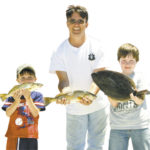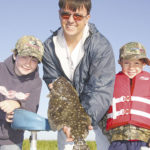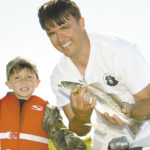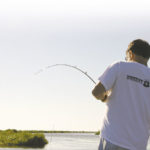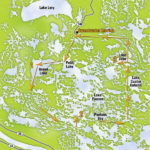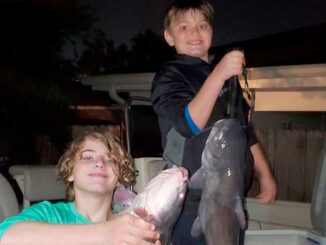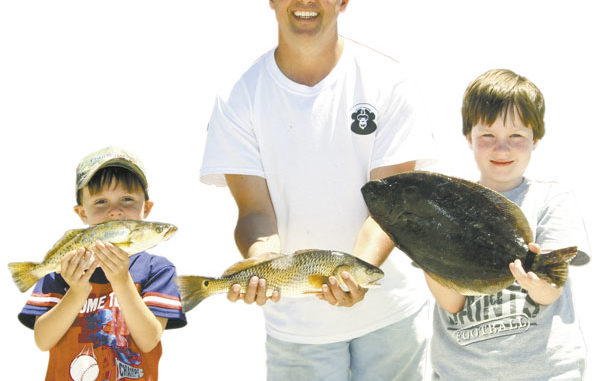
Delacroix trout, reds, flounder still active on inside
Munkey Junk ends every set they play with Cheap Trick’s first-ever Billboard Hot 100 hit “Surrender.” The chorus repeats surrender, surrender, but don’t give yourself away.
That’s exactly how Munkey Junk lead singer Marty Duhon felt at the end of a fishing trip my son Matthew and I made with him and his son Chase recently at Delacroix. He was ready to surrender after scarfing down two of his nearly famous chicken salad sandwiches at lunch, but I would have to argue that he had no reason to hang his head.
No matter what the day threw at him in the form of an unexpected near-gale-force wind, a 5-year-old more interested in snacking than fishing and the unrealistic expectations of an outdoor writer, Duhon simply refused to surrender.
Duhon, who lives in LaPlace and works in the petroleum industry, gave me a number of options for our fishing trip. We could have caught anything from perch to bass to redfish and speckled trout in any number of ponds and lakes.
“But if I could go anywhere I want it would have to be Delacroix,” he said over the phone. “It’s just one of my very favorite places to fish.
“Now I’m a fair-weather fisherman, so I don’t want to go if it’s going to be raining or windy. I fish when the fish are biting and where the fish are biting.”
Duhon and I hand-selected the best-looking day as forecast by any number of weather media outlets. We knew the water was going to be a little muddy after several days — even weeks — of howling wind, but at least we weren’t going to get blown off the water by the predicted 5- to 10-m.p.h. wind.
As Duhon idled his Stratos fish-and-ski boat away from Sweetwater Marina and into Bayou Gentilly, he nonchalantly noted how he always adds 5 to 10 m.p.h. to whatever the wind is forecast to be. Even with that addition, he would be way off.
Capt. Jack Payne, owner of Sweetwater Marina, had told us just minutes before while his crew was getting Duhon’s boat ready to launch that he had caught some nice trout the day before under the birds in Pointe Fienne.
With Payne’s advice in the back of his mind, Duhon headed first to Grand Lake, where he has routinely caught limits of redfish in the past from a grassy point on the west side of the lake. The effects of wind were immediately apparent, and our spinnerbaits disappeared only inches below the water’s surface.
“I can’t believe the water is this muddy,” Duhon lamented. “Even when it gets stirred up, it’s usually clearer back in here because the grass kind of filters out all the sediment. No such luck today, though.”
Duhon pointed out several swirls deep in the grass, so he decided to stick around a little while longer with hopes that redfish would find our spinnerbaits strictly from their vibrations rather than by sight.
Just about the time Duhon decided it was time to cut our losses and try another spot, he noticed that he could see the backs of redfish in some of the swirls. That gave us hope to hang on a little while longer, but we couldn’t get them to eat anything — even Duhon’s redheaded spinnerbait with a green plastic body that, before this trip, he believed to be a near guarantee.
Our day could have quickly spiraled out of control at this point, but Duhon refused to surrender. We worked our way down a straight stretch of grassy shoreline toward the bayou leading into Sun Lagoon. The water may have had about an inch or two better visibility, but that was all it took for the first fish to sense our spinnerbaits.
My son Matthew, who had been relegated to the back of the boat, had been dutifully working the edge of the grass with an avocado/red flake spinnerbait. His spincast reel’s slower retrieve ratio meant his spinner was crawling on bottom more so than buzzing above the grass.
His rod jumped, and I could easily make out his blaze orange Berkley Trilene Sensation line heading out toward deeper water. His drag immediately started protesting, and I caught a flash of his fish. It looked to be a big stingray, so I grabbed my pliers to cut the line.
The fish turned and started splashing near the surface just before I was about to cut it off, and we could all tell by its mottled back that my son was battling a doormat-sized flounder rather than a stingray — a case of mistaken identity that this writer won’t soon live down.
With renewed spirits, we made our way into the Sun Lagoon bayou. It was like an entirely different world. The visibility increased to about 18 inches, and flipping baitfish scurrying ahead of a couple waking redfish signaled that our fortunes were about to change.
“You can one-more-point yourself to death in a place like this,” Duhon said while unhooking our first redfish of the morning. “We’ll keep going in as long as it looks good, but I don’t want to waste a lot of time in here.
“If the fish bite, we’ll stay, but if this was the only one, we’re leaving.”
We left.
An angler was reeling in a redfish at one of the cuts along Orange Bayou, and he let us know in his strong Jamaican accent that he was catching a few. Then we looked at his hook right before he made another cast, and it was adorned with a piece of market shrimp.
“I should have taken up Capt. Jack’s offer of a launch, bag of ice and market bait for $15,” Duhon lamented. “Looks like that extra $5 would have been a bargain right now. Let’s head down to Oak River and get into Pointe Fienne through the Pencil Canal and fish the birds.”
It’s easy to second guess yourself while fishing. What if we would have started over there rather than here? What if we would have bought live bait rather than rely on artificial?
What if all these boats in Pointe Fienne were catching fish?
If they were, that meant we were about to be catching fish, too. We counted nine or 10 boats as we crossed the choppy bay, but we couldn’t tell if they were catching fish, and we didn’t see any birds.
Within just a few minutes of trying the eastern side of Pointe Fienne, Duhon spotted a group of birds diving into the water back the direction from which we just came. Two or three boats, ours among them, raced toward the action.
By the time we settled down and started fishing, one of the other boats was already yanking them in one after another. A couple of quick pull-downs turned up the excitement level in Duhon’s boat even though they were swings and misses on our part.
“This wind is just too much,” Duhon protested. “I’m going to pull us up by the bank like that other boat and anchor us in the marsh grass. Then we can fish and not have to worry about staying on our feet.”
The birds had already vacated the premises, but Duhon’s decision to park his boat in the marsh grass led to the fastest action we had all day long. Our corks started going under in the same general vicinity where the birds had last worked the water. Only this time, we were actually able to hook some of the fish that took our corks down.
Our bite vanished almost as quickly as the nine or 10 boats that had left Pointe Fienne. Duhon decided that we must have arrived at the party just as it was ending, so we headed back to Oak River and ran down to the Twin Pipeline. We ran through Four Horse Lake and turned west into Lake John.
Duhon picked up his spinnerbait rod rather than his popping cork because this has historically been one of his best redfish spots in all of Delacroix. He was hoping to wrap up our day by tugging on a couple bull reds, but the fish just never materialized.
By the time we got to the back of Lake John to the cut where Duhon thought we might be able to land some trout, we were all feeling the effects of the beating sun, relentless wind and muddy water. Perhaps that’s why we weren’t ready for the last opportunity we would have to land a few more fish.
Our corks went under four times, but they came back up just as quickly. That’s when Duhon decided to succumb to his hunger and break out the chicken salad sandwiches. Between bites, he hummed a few bars of “Surrender.”
Fishing is a relative endeavor, and a day on the water has to be judged in relation or in proportion to what others were able to catch. If you catch five and everybody else has 25, then you’ve had a bad day. However, if you catch five and everybody else only has five, then you’ve had a good day.
When we got back to Sweetwater Marina, we realized that what we thought was a bad day actually turned out to not be so bad. Only one boat that we knew of had more fish than we did.
“I just wanted so bad to pull up to a spot and catch them one after the other,” Duhon concluded as he secured his lower unit into its motor toter. “And it just didn’t work out that way.
“It could have been WAY better, but I guess it could have also been a lot worse.”
And like I told my son as we cleaned his fish back at the house, any day you’re able to land a doormat-sized flounder cannot be considered a bad day. Add in a couple redfish and a few trout, and my entire family was so happy later that night as we sat around the dinner table that Duhon had refused to surrender.
Chris Ginn has been covering hunting and fishing in Louisiana since 1998. He lives with his wife Jennifer and children Matthew and Rebecca along the Bogue Chitto River in rural Washington Parish.
